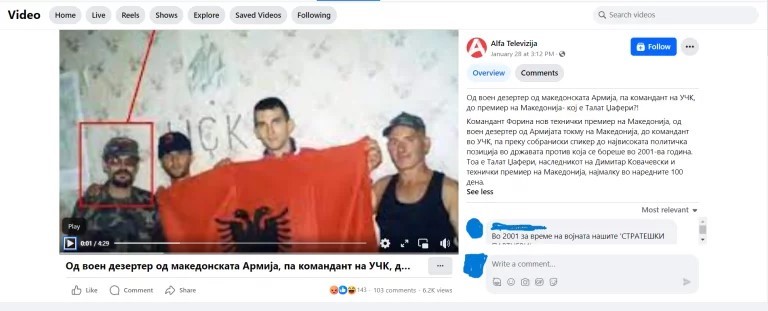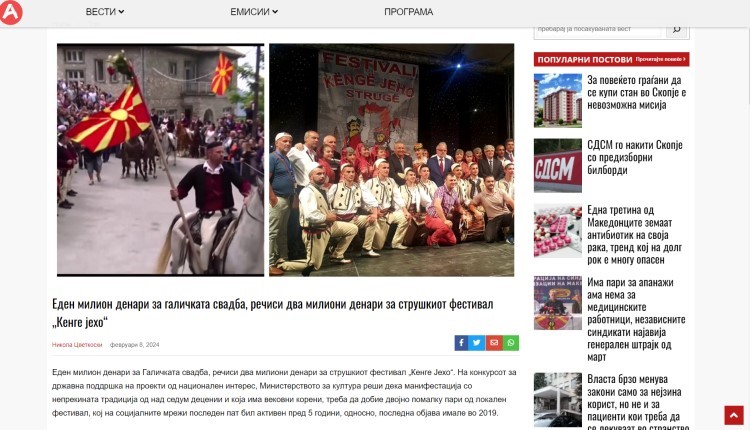A RECURRING PHENOMENON: HATE SPEECH SURGES AGAINST ETHNIC GROUPS IN NORTH MACEDONIA BEFORE ELECTIONS
March 29, 2024
According to the Code of Ethics of Journalists, “Freedom of the media is an inalienable right,” is one of the fundamental principles of journalism. Every journalist should be fully aware that “the fundamental duty of journalists is to respect the truth and the right of the public to be informed,” as per Article 16 of our Constitution.
Considering that political parties in North Macedonia traditionally use nationalist rhetoric to gain political points, hate speech, mainly on ethnic grounds, intensifies significantly in every pre-election period. This year, nothing has changed and the hatred has spread from social networks into the media.
The campaign began unofficially with the formation of a technical government, although the campaign for the presidential elections is scheduled to start on April 4 and end on April 22, while the campaign for the parliamentary elections specifically should commence on April 18 and last until May 6, as reported by Portalb.mk.
One of the most disturbing forms of party propaganda in the pre-election period in our country is the spread of hate speech on ethnic and even religious grounds. This situation becomes even more disturbing when such content receives media space. Since there is no law regulating the work of online media in North Macedonia, most online information platforms are plagued with disinformation, propaganda, and unprofessional journalistic reporting. The phenomenon of the media becoming loudspeakers for nationalist propaganda is not new.
Sefer Tahiri, a journalist and university professor who has been closely following political and social developments since the country’s independence, asserts that hate speech on ethnic grounds has consistently permeated our media.
“Hate speech has always been prevalent in the media, particularly targeting ethnic and religious groups. It was evident at the political gatherings of the right-wing ethno-nationalist party VMRO-DPMNE (The Internal Macedonian Revolutionary Organization – Democratic Party for Macedonian National Unity) during the 1990s, and it was certainly not absent from those of SDSM (The Social Democratic Union of Macedonia) between 1993 and 1998. It escalated during the conflict in 2001 and resurfaced after the Ohrid Agreement was reached. From 2002 to 2006, inter-ethnic relations calmed, leading to a decrease in the use of hate speech. However, it resurged after 2010 when Gruevski and his party amplified such rhetoric through their anti-Albanian propaganda. In 2017, there was a political and inter-ethnic relaxation, with fewer instances of hate speech,” explains Tahiri.

Articles from various media portals with headlines that refer to Talat Xhaferi, the current Prime Minister of North Macedonia, as” Commander Florina’’, criminal and terrorist with intentions to stir inter-ethnic hatred.
Media responsibility is crucial given the media’s extensive reach and credibility. However, examples in our country demonstrate that not every journalist adheres to professional ethics.
One notable example is Alfa Television, a national media outlet in the Macedonian language, which consistently publishes materials aimed at inciting inter-ethnic hatred. This trend appears to intensify, particularly during election campaigns.
On January 28, Talat Xhaferi, a member of the DUI, assumed the position of head of the technical government, marking the first instance of an Albanian holding the position of prime minister in the country. Xhaferi boasts a lengthy political career in North Macedonia. However, while this fact should be the primary focus of media reporting on his suitability for the role, certain media outlets have surpassed professional ethics. Instead, they exploit the situation to propagate hate speech to the public. An example of this can be seen in the media coverage of Talat Xhaferi published by Alfa Television.
Example 1 of Alfa Television inciting inter-ethnic hatred prior to elections:

The explainer in the post again refers to the past of the current Prime Minister Talat Xhaferi, stating he is a military deserter from the army and later a commander in the UÇK who fought against the Macedonian security forces. Meaning he is a threat to the Macedonian society.
Despite the fact that tendentious headlines have no place in professional journalism, some national television channels continue to spread hate speech on ethnic grounds through such headlines, especially during election periods. An example of a headline with a clear intention to incite hatred towards Albanian politicians in the country is the following: “May God help Macedonia: Zijadin Sela, Ali Ahmeti’s last Trojan Horse”.
Example 2 of Alfa Television inciting inter-ethnic hatred prior to elections:

The explainer in the post refers to the political party DUI (The Democratic Union for Integration) the largest ethnic Albanian political party in North Macedonia. DUI is the third largest political party and because of its influence is being presented as a ‘’owner of the country’’.
In addition to political issues, the spread of hate speech can also be observed in reports on culture. Although culture should serve as a means of bridging gaps between diverse communities, when news in this field is broadcast without adhering to professional standards, it can lead to unnecessary conflicts. An illustration of how hate speech spreads in cultural reporting can be seen in the example below:

Reporting by Alfa Television – hate speech and culture news
The article writes about the amount of financial support that two different events are getting the ‘’Gaelic wedding’’ and the ‘’Kange Jeho’’ Struga Festival. Claiming that in a competition for state support for projects of national interest, the Culture Ministry decided that an event organized in Sruga, where the dominant population is ethnic Albanian, is worth more trying to provoke anger and polarization.
What follows these reports is an avalanche of comments where citizens vent a lot of anger and hatred towards their fellow citizens. Encouraged by such content, public comments on social networks where these materials are published range from the most banal insults and curses up to wishes for the death and extermination of an entire people.
According to Professor Sefer Tahiri, such propaganda is dangerous for our society, because in many cases it can also be an indicator of physical violence. “Ethno-nationalist propaganda is dangerous because it incites ethnic hatred, but it also leads to physical violence with ethnic or religious motives. The media must beware of the use of speech containing prejudices and stereotypes, but also of hate speech, because the media can encourage ethnic and religious tensions with disastrous consequences for society.”
According to data from IRI research, Alfa Television ranks among the top five most watched television channels in our country. So, the number of those who are influenced by the content this media broadcasts is very large. In cases where media outlets lack mechanisms for self-regulation and have no knowledge of how to determine the boundaries of ethics and professionalism, it is necessary, above all, to develop media literacy in our society.
“Firstly, the regulatory and self-regulatory mechanisms must function, the concept of media literacy must be developed, the role of the public radio-television service must be strengthened, and there must be training for journalists and editors,” Sefer Tahiri said.
According to the Code of Ethics of Journalists, “Freedom of the media is an inalienable right” is one of the fundamental principles of journalism, and every journalist should be fully aware that “the fundamental duty of journalists is to respect the truth and the right of the public to be informed”, as per Article 16 of our Constitution.
In the Code of Ethics of Journalists, a separate article outlines the obligations of journalists regarding reporting during election campaigns. Article 10 of the Code emphasizes the following: “Reporting on political processes, particularly elections, must be impartial, balanced, and fair. Journalists are expected to maintain professional distance from the political subjects they cover.”
Additionally, the Code provides a definition of professional reporting regarding discriminatory elements. All of this is done keeping in mind the importance of the media in the formation of public opinion. Article 10 of the Code states:
“Journalists shall not consciously create or process information that jeopardizes human rights and freedoms, shall not use hate speech, and shall not encourage discrimination of any sort (nationality, religion, sex, social class, language, sexual orientation, political orientation…).”
The presence of hate speech in the media is a global phenomenon with a very long history. The definition of “hate speech” was established by the Council of Europe Convention on Cybercrime in 1997. The term “hate speech” encompasses all forms of expression that “spread, incite, promote, or justify racial hatred, xenophobia, anti-Semitism, or other forms of hatred based on intolerance. This includes intolerance expressed through aggressive nationalism and ethnocentrism, discrimination, and hostility towards minorities, migrants, and people of immigrant origin”.
Author: Shefkije Alasani
This article was originally produced for and published by PortALB. It has been re-published here with permission.
Translation in Macedonian available here.
